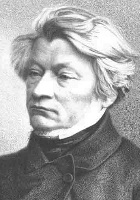The Prisoner's Return Poem by Adam Mickiewicz
The Prisoner's Return
(Part Three, Scene Seven)
Him! So I rushed. 'But there will be a spy.
Don't go today.' I made another try
The morning after. Police thugs at the door.
The next week, too, I went. 'His health is poor.'
And then, at last, when traveling out of town
They told me that a fat but broken-down
Fellow was my friend. His hair had gone; his skin
Was a puffed sponge that wrinkles burrowed
Bad food had done it, that and rotten air.
I never would have known him, sitting there.
I said good day. He couldn't place my face.
I introduced myself, but not a trace
Of recognition. Then I reminded him
Of this and that. His glance grew deep, kept dim.
And all his daily tortures, all the fears
Of sleepless nights, and all the thoughts, the years,
I saw; but only for a moment: then
A monstrous veil descended once again.
His pupils, like thick glass refracting light,
Looked grey when stared at but could shine with bright
Patterns of rainbows when glimpsed from the side.
Cobwebs are like that too: their grey threads hide
Sparks and rust-reds and spots of black and green:
Yet in those pupils nothing could be seen.
Their surface, quite opaquely, showed that they,
Had lain a long time in the damp dark clay.
Next month I called on him, hoping to find
A man at ease, refreshed, in his right mind.
But many questioners had had their say,
Ten thousand sleepless nights had passed away,
Too many torturers had probed, and he
Had learned that shadows make good company
And silence is the only right reply.
The city, in a month, could not defy
The laws that had been taught him year by year.
Day was a traitor, sunlight a spy: his fear
Made turnkeys of his family, hangmen of guests.
The door's click meant: 'More questions. More arrests.'
He'd turn his back, prop head on hand, and wait
Collecting strength enough to concentrate.
his lips pressed tight to make them one thin line.
He hid his eyes lest they should give some sign,
And any sign might tell them what he thought.
The simplest question seems to have him caught.
He'd crouch in shadows, crying 'I won't talk.'
Because his mind was made of prison rock
So that his cell went with him everywhere.
His wife wept long, kneeling beside his chair.
But maybe it was mostly his child's tears
That, finally, released him from his fears.
I thought he'd tell his story in the end.
(Ex-convicts like to speak to an old friend
About their prison days.) I'd learn the truth,
The truth that tyrants hide, the Polish truth.
It flourishes in shadows. Its history
Lives in Siberia where its heroes die,
There and in dungeons. But what did my friend say?
He said he had forgotten. And, with dismay,
I listened to his silence. His memory was
Written upon, and deeply, but, because
It had long rotted in the dark, my friend
Could not read what was written: 'We'd better send
For God. He will remember and tell us all.'
This poem has not been translated into any other language yet.
I would like to translate this poem